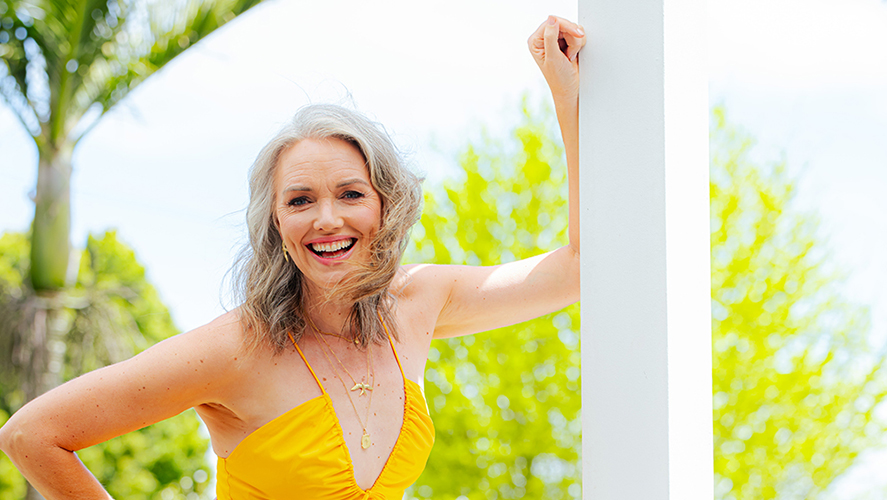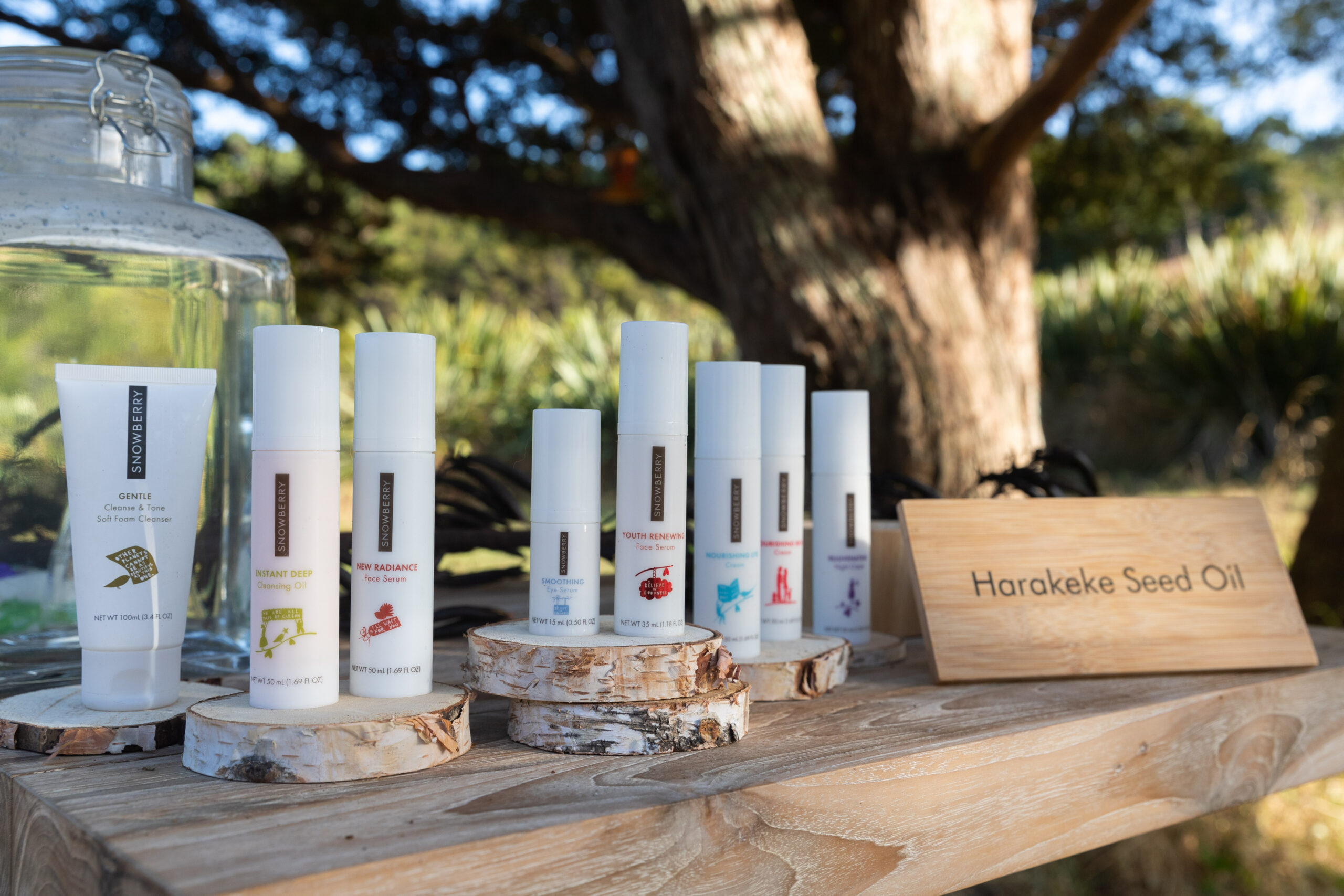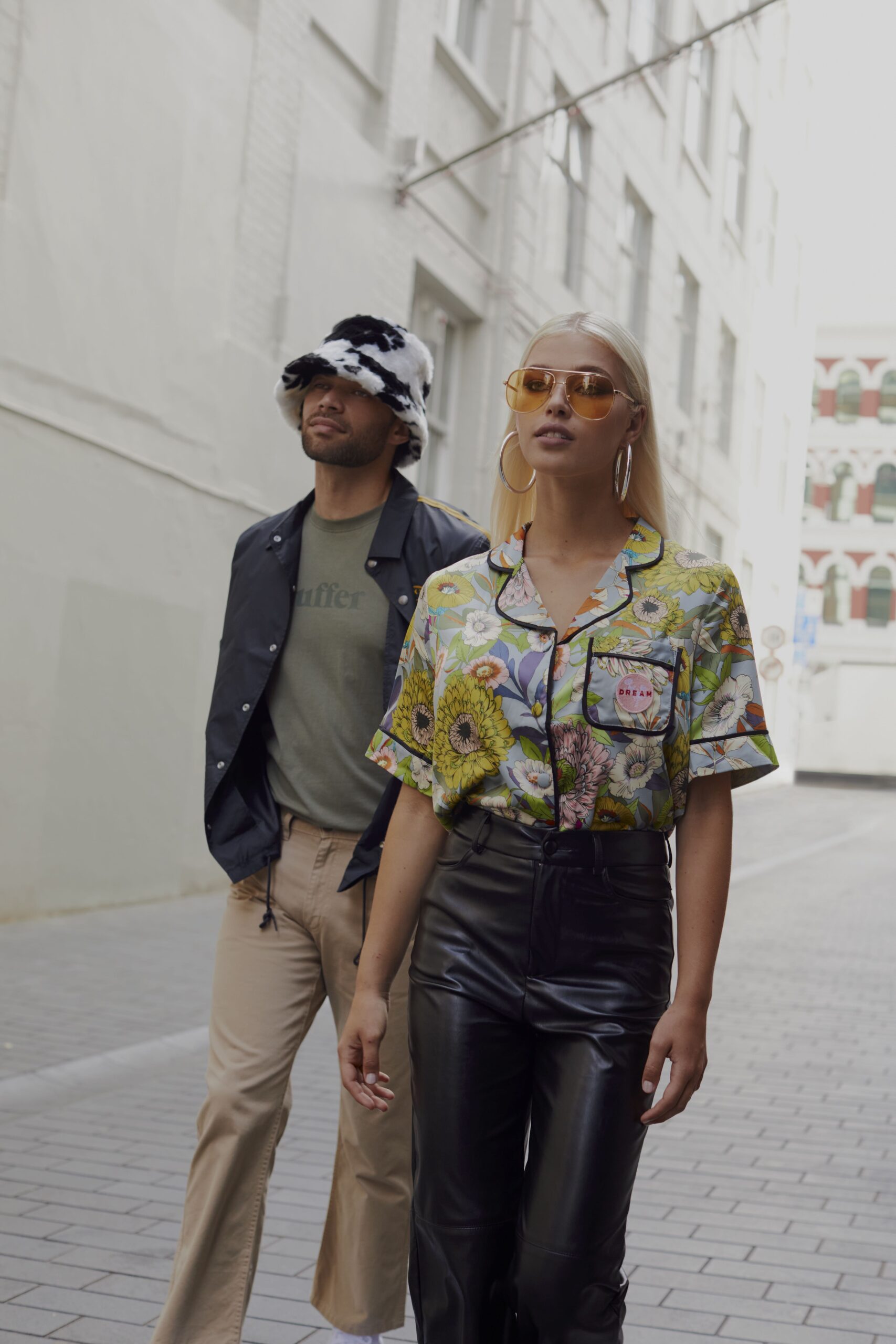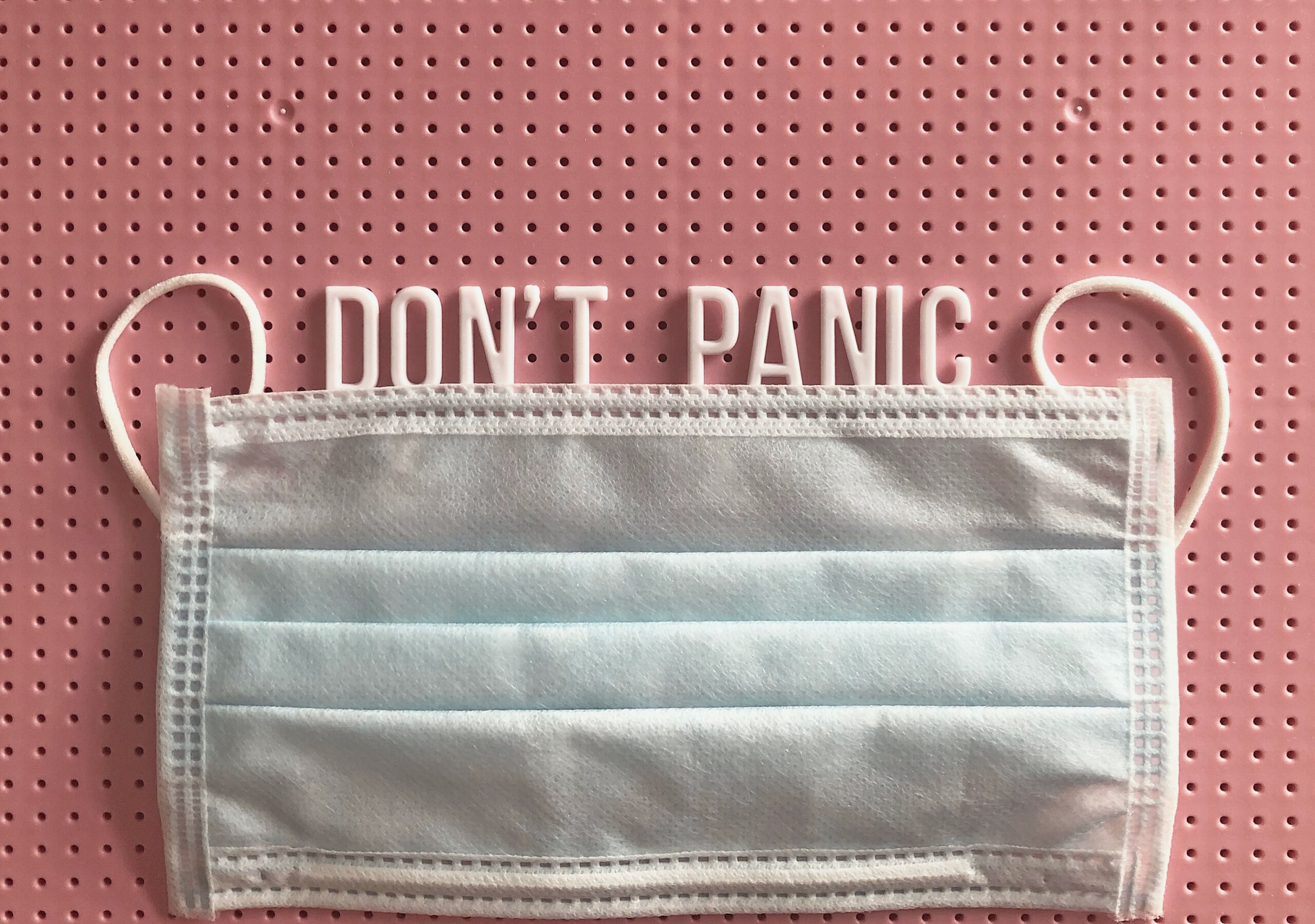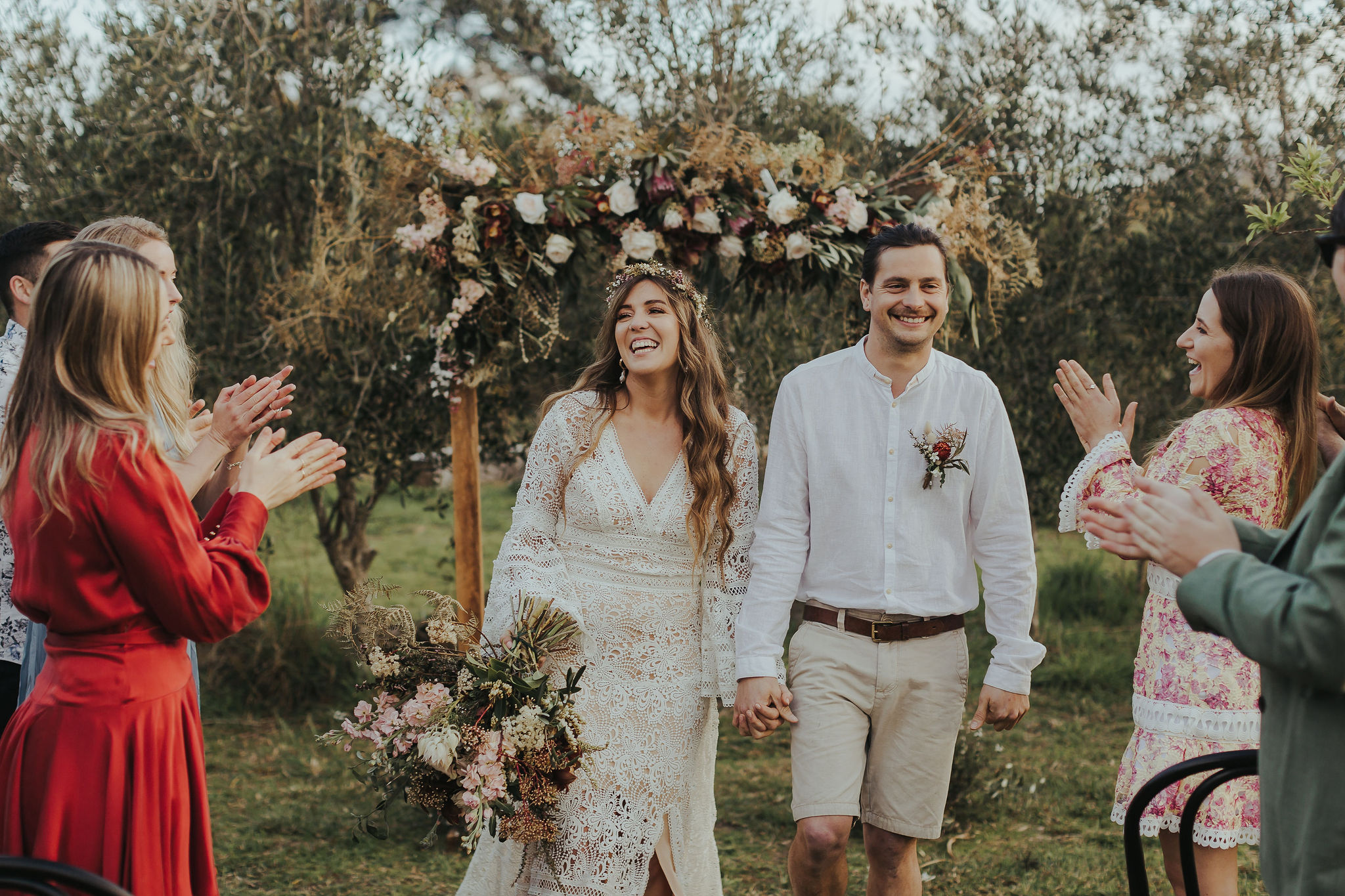Photography Andrew Coffey.
Hair and make-up Justine Conroy using Aleph Beauty. Styling Carolyn Enting and Petra Bagust.
At 51 Petra Bagust is excited for the future and embracing everything this season has to offer.
Since launching her podcast Grey Areas, broadcaster Petra Bagust has helped lift the taboo on talking about perimenopause and menopause, and its high ratings have proved that it is more than a sporadic hot flush.
Its sizzling success politely gives the finger to a male exec naysayer of the project because “who’s going to listen to that?!”.
Now in its fourth season with a fifth in the planning, Grey Areas is a place where women are free to express themselves and talk openly about navigating menopause – the pros and the cons.
At age 51, Bagust is excited for the future and “this season” as she likes to put it, and she’s not referring to her podcast, Christmas or the summer break – though it’s a favourite time of year.
She’s speaking about menopause and her decision to “age intentionally”.
“I feel excited, challenged, curious and positive about it,” she says.
Her decision comes after pondering whether she was willing to embrace the benefits of ageing as well as the challenges. Let go of the benefits of being young and embrace the newness and opportunities ageing offers. And with that, came a sense of freedom.
Letting her hair go naturally grey has been part of that and while she maintains a skincare routine, she is not worried about erasing wrinkles.
“I don’t want to pursue something that’s not part of the season. Am I a purist?” she asks. “No, I’m just embracing as much as I can and who I am is more important than how I look. Who I am, how I am in the world and how I behave and treat others is a reflection of how I treat myself and is more important than if I look 35 or 40.
I had my turn when I was 25, 42 – if I’m putting all my energy into that, I’m fighting a losing battle.”
Bagust admits she did try Botox once with a beauty therapist friend out of intrigue, but it just didn’t feel good.
“It gave me a headache but more than that, it’s just not me,” she says. “My forehead moves. I’ve got lines on my forehead. No, I don’t always like how they look but if I look at the whole of my face, I think, ‘oh yeah, that’s me’.”

Paris filter
On social media, when she’s about to post a reel promoting the podcast, she’ll often experiment with swiping the Paris filter over her video and then take it off, swipe again, take it off, observing how the filter softens all those lines and makes everything lighter and brighter.
She admits it’s tempting to want to swipe Paris but prefers to put herself out there as she really is.
“People might look at me and go, ‘oh my, look at her now, she’s really aged’ and that’s fine. What about all the women who are ageing alongside me, who go, ‘yeah, I’ve got lines too’. We need to see each other and ourselves as perfectly good as we are. So, I’m not saying I’ve never used the Paris filter or tried Botox. I haven’t tried anything else and I don’t think I will.”
She’s also choosing to work with her body rather than fight it. “Why do we use oppositional language with our bodies in our biology,” Bagust muses. “What if we were able to align ourselves with our bodies, see them as our very dear friends, our closest good friend, our friend we literally can’t live without.”
Mind, body, spirit
The mind, body, spirit connection is what she is referring to, and how we tend to separate them.
“More and more we understand that they’re intertwined. Psychological issues will show up physically and physical issues will show up psychologically if you’re treating the symptom rather than the cause,” she explains.
Bagust is a big fan of Dr Hilary McBride’s book The Wisdom of Your Body. “She’ll say things like, ‘coming home to your body’, and that’s a phrase I love. My body is with me and for me, and I’m with it and for it. But as a society we’ve separated them out, and the language we use is a clue to our orientiation towards our bodies and how we treat them.”
Not separating ourselves from menopause – a natural biological transition – is part of that.
Through her podcast platform Bagust talks openly about her own journey from when she launched the podcast age 49 to present day – brain fog, tiredness, overheating episodes, feeling achy, weight gain and experiencing rage briefly intersected with anxiety for the first time in her life.
Around the time of launching Grey Areas she was “in the throes of a hormonal storm” and had questions about that. Up until that point she’d only heard negative rhetoric around menopause. “I remember thinking that can’t be the whole story.”
She was curious and admits having what she describes as a mild rant on Instagram when the exec feedback about her idea for the podcast got back to her.
“Why doubt and disbelieve and expect the least? Why discount women in this season? Why discount this kind of conversation?”
Creating a number one ranking podcast and sustaining the momentum has come down to a number of factors, including her broadcast partner MediaWorks who she says have helped the podcast succeed.
“If we had just released it and nobody had heard anything about it, they wouldn’t be listening, but it was right place, right time. And it was the right conversation to be having because it was real for me – it is real for me.”

Finding freedom
Bagust is grateful she has her mum, Judi, to chat to. “Some women suffer terribly, some don’t notice it, and most like me suffer some symptoms – though I don’t like calling them symptoms because it medicalises this transition and ends up leaning towards an illness which it is not. It’s a biological transition that happens to all women with uteruses and who reach a certain age,” she explains. “It’s a rewiring of the brain, it’s a hormone transition that’s incredibly powerful and has significant impact before, during and after. And anyone who’s had a complex relationship with their hormones knows that better than most.”
She also believes her body wants the best for her and to help her. “I’m really seeking to listen, align myself with, understand and work with my body because I believe my body is seeking the same.”
When she suffered from brain fog, she joked with husband Hamish about potentially getting a stutter because she’d start a word over and over again.
It felt a bit like when she had children and couldn’t finish a sentence only that there were no children running around demanding her attention.
For a brief period she also experienced anxiety for the first time, and gained an understanding of people who live with it and its effects on daily life.
During the Covid lockdowns she took up yoga, which has become a morning at-home ritual for she and Hamish. An online class, five mornings a week for between 15 to 30 minutes.
She also loves walking the dog in nature – “it’s so good for my heart, body and soul. It’s just a triple whammy”. Walking more has also helped her lose the weight that was making her feel uncomfortable.
Initially she embraced the weight gain, thinking it was a given for this season of life, so was pleasantly surprised when it dropped off after a holiday in France where she “walked, and walked and walked”. In the meantime, daughter Venetia was, and continues to raid her extensive wardrobe filled mostly with New Zealand labels Bagust is passionate about supporting.
Bagust has a growing new relationship with food and says she’ll end up being the weight her body wants her to be.
“My relationship with my weight is pretty standard white western middle class where if you are skinny, you’re good. I got tired of that because again, my body was either succeeding or failing, it’s either good or bad, for or against me. I saw the acceptance as an opportunity to find freedom and wholeness.”
Bagust believes that during and after menopause women can take on the world because hormonally you’ve got less estrogen in your system.
“In menopause we are released into this low estrogen season that comes with challenges, some more than others, but it also comes with a new orientation, creativity, energy and passion. We can literally look out and go, ‘what do I want to spend my time in this season doing, thinking, being?’ ‘What shall I put my hand to?’ ‘What shall I set my heart to?’ ‘What is it that I want to pursue?’ There’s a stronger sense of being, or hello, I’m back, or I’ve arrived.”
Going deep
The former Breakfast host is relishing podcasting over making television because it allows her to go deeper. It’s long form, in-depth, personal conversations with people she respects or is fascinated by, and she has more creative input. There’s also an intimacy and immediacy to podcasting that you don’t get with the technical requirements of television.
What’s more, you can watch whole episodes of Grey Areas on YouTube, too, if you prefer that to listening in.
“Women have so much wisdom and we can and do support one another. If we can do that in this way, where we share our stories, where things resonate, take what serves us and leave what doesn’t, and find the answers within. Let’s turn to ourselves with trust, compassion and love and go for gold. We don’t have all the answers, but we can walk gently with ourselves, and that’s how we kind of finish off every Grey Areas episode – walk gently with yourself and your pelvic floor, or friends, or grey hair.
“I’m getting my preach on here I realise, but usually, people try and pick best friends that are good for them. Let’s be a best friend to ourselves. I’m really interested in women turning towards themselves with more trust – trust their knowing, trust their guts. For me, I have a deep wellspring of faith and the source of that is love incarnate. So, why not turn to this divine source of love and draw on it, and increase the amount of love in the world.”

Learning and loving Te Reo
Listening in, one can’t help noticing how beautifully Māori words roll off her tongue.
It’s the result of three years of classes and it took her two years to learn pronunciation which was confronting because she talks for a living.
She is not fluent but has built a strong vocab and has some waiata (songs) and whakatauki (proverbs) to fall back on.
“Each culture has gifts to give, and tangata whenua Māori have given our nation so many. So, learning tikanga and some Māori wisdom is an immense addition to my life and allows me to look at things that I’ve seen in one way in a more broad, more expansive way,” she explains.
“Being a Te Reo Māori learner is the discovery of a treasure that’s hidden in our land, and it’s valuable and an addition to life. Māori stories, phrases, and words add an additional perspective on life and that makes me more whole and well-rounded.
“Getting an insight into another culture, I’ve experienced a breadth of knowledge or wisdom and ways of being in the world. I’m like, ‘oh, that’s another way of seeing it’. If we’ve got one lens, one way of seeing the world, we think the world is the way we see it, that what we see of the world is the way the world is. When we see the world through another person’s lens, whether it’s a different cultural lens, age lens, socioeconomic or gender lens, all of a sudden, you’ve got this additional way of seeing the world, which is a different pair of glasses.”
Learnings
Bagust has also taken away many learnings from her podcast guests that include pelvic floor and vulval skin health. “Another joy of doing the podcast for me has been meeting with women who are further down the road than me and seeing what they have grappled with and where they’ve taken it,” she says. “It’s not that we’ll take the same road necessarily but there are these intersections where we get to ask important questions and it is up to us where we spend our energy and what path we take. I might go and study again or develop a new skill that I haven’t had until now or write a book… and I think it’s learning that what we do every day is of more value than what we do every once in a while. We think about big radical change but it’s the everyday human-sized changes that we can make. Does that excite me? Yeah, 100 per cent it does.”
Full house
Additionally, to recording two podcasts – her other one is Sunday Sanctuary (a safe space for spiritual chats that nourish the soul) – and being a media chaplain, life in Bagust’s household is busy. Husband, freelance cameraman Hamish Wilson also works from home, and the kids – Venetia, 20, Jude, 18 and Teddy, 16 – are not so little anymore. Mum and Dad are also on the premises and Bagust wouldn’t have it any other way.
Despite Bagust’s high public profile the rest of the family mostly fly under the radar.
Recently Venetia posed with her mum for the Breast Cancer Cure’s summer t-shirt campaign, for which Bagust is an ambassador.
“If they want to be in the public eye, they can pursue it and reap the reward, blessing and burden of that, because that’s not for everybody and it has both positives and a price. That said, I haven’t been ultra-protective of them. I’ve just been as positively thoughtful and intentional as I can be. My husband is a very private man despite being on several magazine covers with me, so he’s a wonderful foil to my sharing. Every now and then a child will show up on my Instagram account because they are definitely part of my life. But I’m conscious that their lives belong to them.”

Feeling festive
When it comes to celebrating Christmas it’s the more the merrier as far as Bagust is concerned.
Bagust’s mum, Judi, is amazing at table settings and food, and they always make an effort to decorate the home.
“I’m interested in a joyful but compassionate Christmas where my expectations aren’t high on it being perfect. I want to eat yummy food, chillax and hang out with my family.”
Summer reset
One of Bagust’s favourite things about summer is that it is a time for reading books and resetting for the year as well as the opportunity to socialise with friends and family.
This year will be the family’s 12th summer on Great Barrier Island where she and Hamish own a patch of land a few minutes walk from the beach. Get-togethers are a collaborative bring a plate affair.
With caravans on the section, the family camp on Great Barrier enjoying bush and beach walks, lounging in bean bags reading books and multiple swims most days, as well as eating and drinking and “having yarns about nothing”.
She doesn’t worry about making New Year resolutions anymore.
“Is the summer break a wonderful time to take stock and make some decisions about how you want to launch? Yes, but not to try and change 15 things about your life and fail within the first month and beat yourself over the head with a stick.”
One year she ran the length of Medlands Beach and moaned the whole time. By the end of the holiday she was running 2km with ease which she built up to 6km and ran for the next six years. Her body is telling her it doesn’t want to run anymore so she’s embracing yoga instead, however, it did show that sometimes when there is a break in the daily grind, it can allow the space to add something and establish a new habit.
Looking ahead to 2024 she wants to keep making Grey Areas and is curious to know where it could go, and what other grey areas she can dig into that would be useful for women to hear about.
“I’m enjoying work more now than I ever have in my life. It feels like this wonderful season of very fulfilling mahi for me.”


